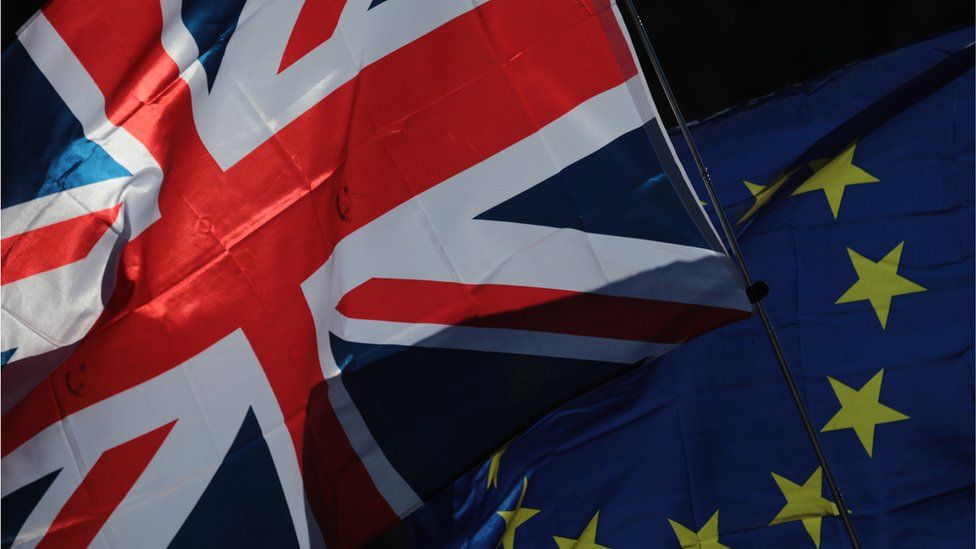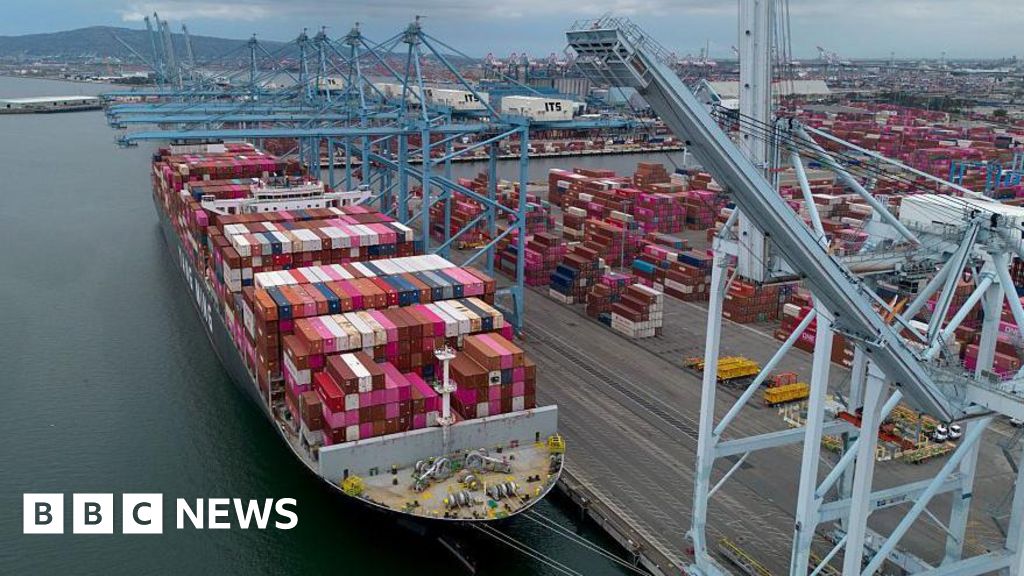ARTICLE AD BOX
 Image source, Getty/Luke MacGregor/Bloomberg
Image source, Getty/Luke MacGregor/Bloomberg
By John Campbell
BBC News NI economics and business editor
Boris Johnson fought and won the 2019 UK general election with the slogan "Get Brexit Done".
It was a bet that voters were fed up with years of Brexit drama and wanted the government to cut a deal and finally get out of the EU.
With a healthy majority, Mr Johnson was able to sideline the Democratic Unionist Party (DUP) and do the deal which effectively left Northern Ireland inside the EU's single market for goods.
For most voters in Britain, that may have been enough for them to accept that Brexit was largely finished with.
But in Northern Ireland the sea border continued to dominate politics, ultimately leading to the collapse of devolution.
Image source, Reuters
Image caption,A poster reading "No Irish Sea border" displayed in the port of Larne, Northern Ireland, in June 2022
With the Windsor Framework - and a subsequent side-deal with the DUP - leading to the restoration of devolved government, there is perhaps an argument that Brexit is now "done" in Northern Ireland too.
However events this week show that is a difficult argument to sustain.
Northern Ireland, the single market and Brexit
Medicines have been one of the most difficult post-Brexit trade issues in Northern Ireland.
That is because Northern Ireland has remained in the EU's single market for medicines, despite getting most of its medicines from distributors and manufacturers in Great Britain.
Under the terms of the original deal, the Northern Ireland Protocol, medicines being sent from Great Britain to NI would have required retesting and relabelling to ensure they met EU standards.
Image source, Getty Images
Image caption,Veterinary medicines still face the prospect of needing to meet those expensive retesting and relabelling requirements
The EU ultimately agreed to major changes for human medicines but veterinary medicines still face the prospect of needing to meet those expensive retesting and relabelling requirements, and the risk they will be withdrawn from sale as a consequence.
The history of Brexit suggests a deal will ultimately be reached on this issue but that will first require a serious negotiation.
The Lords report found no evidence that a negotiation has yet started and the committee chair, Lord Jay, suggested it might not happen until after the European and UK elections.
The challenge of 'unfettered' access
However goods from the Republic of Ireland are exempt from these checks for now.
That is mainly because the facilities at the Irish Sea ports in Wales are not ready and are unlikely to be complete until the first half of next year.
Also hovering around this issue is the question of how to impose controls on Republic of Ireland goods entering Great Britain without disturbing the "unfettered" flow of goods from Northern Ireland.
Unfettered access for Northern Ireland goods was a central Brexit promise from the government.
That promise is given legal form by the Qualifying NI Goods Regulations, which say that most goods in free circulation in Northern Ireland count as qualifying for unfettered access.
There are tighter requirements for food and animal feed.
The major challenge around enforcement is how to impose controls on non-qualifying goods without interfering with the free flow of qualifying goods.
For example, goods from the Republic of Ireland can flow freely into Northern Ireland; the UK government says it is not going to be checking shipments from Northern Ireland as they arrive at Cairnryan in Scotland.
So how will any illicit Irish goods be detected on this route?
The suggestion is spot checking, but the precise way in which this part of Great Britain's post-Brexit border will be enforced is not yet clear.
How Stormont consent will keep Brexit live
Image source, eclipse_images/Getty
Image caption,A vote on pet food demonstrated how Brexit is going to remain a persistent feature of Northern Ireland politics
A vote in the Northern Ireland Assembly this week demonstrated how Brexit is going to remain a persistent feature of Northern Ireland politics.
It was not a regulation drawn up by a Stormont minister or assembly member, instead it was piece of EU law flowing from the Brussels regulatory system.
The assembly was voting on whether it should be added to the body of EU law which continues to regulate the production and sale of goods in Northern Ireland.
In this case, it was relatively uncontroversial as the practical effect of the regulation is to align UK and EU rules.
Most unionists who voted were content to back the regulation as failing to do so would create more divergence between Great Britain and Northern Ireland.
That means the regulation got the necessary cross-community support and will be implemented.
However the first of these "applicability motions", on an equally obscure area of regulation, did not get cross-community backing.
The UK government now has to decide whether it will make this a subject of negotiation with the EU or impose the regulation without unionist support.
There will be a conveyer belt of these applicability motions for as long as Northern Ireland is in the single market for goods and the rest of the UK is not.
The potential for them to become a focus of political disagreement is obvious: between unionists and nationalists in the assembly, between the local parties and the UK government and between the UK and the EU.
This week's debate also pointed to the continued potential for intra-unionist tensions.
The TUV leader Jim Allister, who voted against the motion, decried the DUP position and also described that party's benches as having some "notable absentees".
Some 15 DUP assembly members supported the new EU law but nine DUP members were not present for the vote.

 1 year ago
43
1 year ago
43








 English (US) ·
English (US) ·